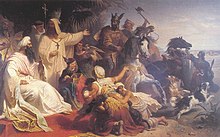Harun al-Rashid

Harun al-Rashid (also: Haroon al-Rasheed), was an Arab caliph of the Abbasid Empire, ruling from 786 to 809. He has become an icon of the Islamic golden age. He appears in many stories as a wise ruler, who often disguised himself as a peasant in order to walk amongst the people in Baghdad to find out how they lived and how he could improve their situation. His legacy has been cemented through his representation in the Arabian Nights.
Domestically, Al-Rashid pursued policies similar to those of his father al-Mahdi. He released many of the Umayyads and 'Alids his brother al-Hadi had imprisoned and declared amnesty for all political groups of the Quraysh.[1] Large scale hostilities broke out with Byzantium, and under his rule, the Abbasid Empire reached its peak.[2]
References
- ↑ Ghareeb, Edmund A.; Dougherty, Beth (18 March 2004). Historical Dictionary of Iraq. ISBN 9780810865686.
- ↑ Ghareeb, Edmund A.; Dougherty, Beth (18 March 2004). Historical Dictionary of Iraq. ISBN 9780810865686.